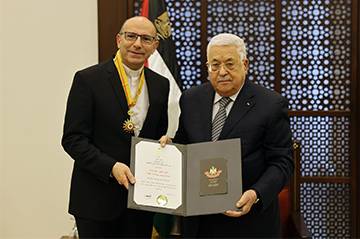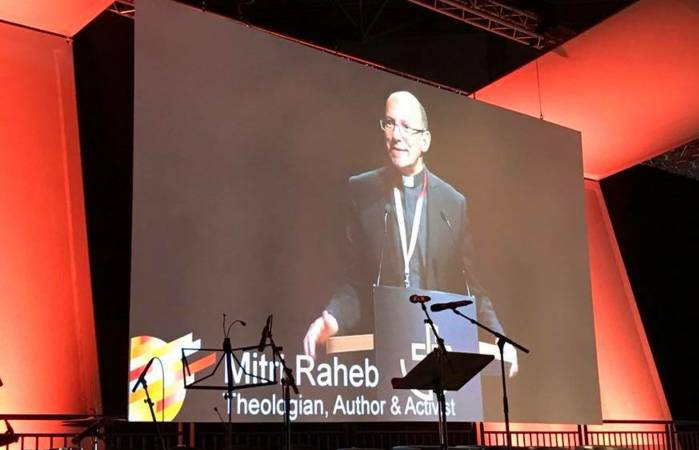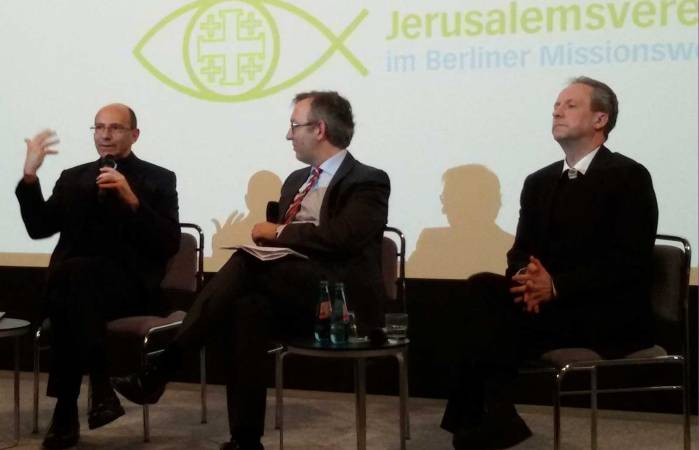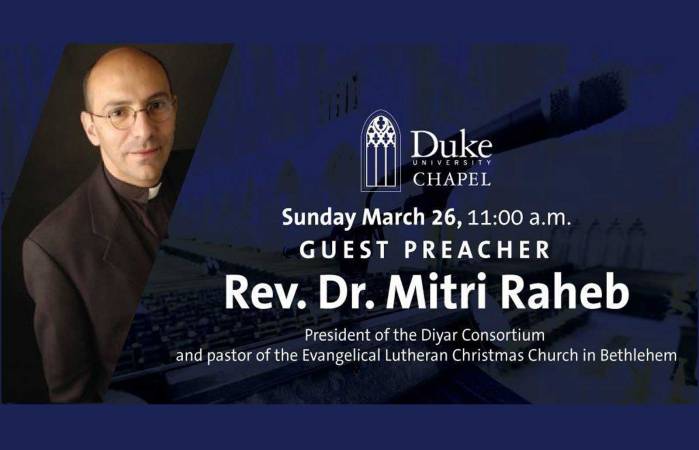Theology Festival Sweden - Uppsala
Teologifestivalen
Luke 2, 22-40
It is truly an honor to be with you these days and to have the privilege of preaching in this service. I would like to thank Anna Karin as well as Archbishop Antje for their friendship and support.
I can imagine that some of you might be anxious wanting to see how this Palestinian, Arab, Christian and Lutheran pastor is going to deal with this text. This is not an easy text to preach from, but it is without any doubt an exciting one.
Let’s first look at the context of the text. As a contextual theologian the context is where we start.
- The Context: The text speaks of a time around the turn of the millennia, two thousand years ago. The location is in Jerusalem, in Palestine, exactly speaking in the Jewish Temple. There we meet two elderly people. A man and a woman. The man’s name is Simon. Simon is not a name that we encounter in the Old Testament. He wasn’t one of fathers of the Hebrew bible. It is a name that we encounter only in the New Testament. But for sure there must have been a reason why Simon parents chose this specific name for their child. Simon must have represented a figure dear to their hearts. To know what Simon represented, we have to search in the time between the two testaments, to be exact in the times of Maccabees. Simon was the name of the military commander and chief priest in Jerusalem in 143 BC. At that time, Palestine was under the occupation of the Seleucid Empire. The Seleucids, based in Syria, were eager to continue the process of Hellenization that was started earlier by Alexander the great. A process of Hellenization of Jerusalem, and of transforming the Jewish temple into a Greek temple, where the Seleucid king is worshiped. Against this Hellenization process, Mattathias started a revolt against the Seleucid occupation of Palestine. Mattathias died, his son Judas became his successor. He became known as Judas Maccabeus. He was able to push back the Syrian Seleucids and to restore the old order of the temple (164). This victory is what Jews celebrate at Chanukah in December each year. Yet it was only 4 years later that the Syrian Occupiers were able to revenge and kill Judas. His brother Jonathan took over and continued the liberation uprising against the Seleucids. He also was killed in 143 BC by the Seleucids. In this context the third brother, Simon, took over and created in 140 BC the Hasmonean dynasty. Although Simon did not reign for more than 10 years, he was considered a hero and so we read in 1 Maccabees 14, 4-15:
- The country was at peace throughout the days of Simon. He sought the good of his nation and they were well pleased with his authority, as with his magnificence, throughout his life.5 To crown his titles to glory, he took Joppa and made it a harbor, gaining access to the Mediterranean Isles.6 He enlarged the frontiers of his nation, keeping his mastery over the homeland, 7 resettling a host of captives. He conquered Gezer, Beth-Zur and the Citadel, ridding them of every impurity, and no one could resist him.8 The people farmed their land in peace; the land gave its produce, the trees of the plain their fruit.9 The elders sat at ease in the squares, all their talk was of their prosperity; the young men wore splendid armour.10 He kept the towns supplied with provisions and furnished with fortifications, until his fame resounded to the ends of the earth.11 He established peace in the land, and Israel knew great joy.12 Each man sat under his own vine and his own fig tree, and there was no one to make them afraid.13 No enemy was left in the land to fight them, the very kings of those times had been crushed.14 He encouraged the afflicted members of his people, suppressing every wicked man and renegade. He strove to observe the Law, 15 and gave new splendor to the Temple, enriching it with many sacred vessels.”
The Parents of Simon that we encounter in this text must have had this Hasmonaen Simon in mind. They were anxious for a time when they will be free from occupation. In the meantime, the Seleucids were gone, but only to be replaced soon by the Romans who occupied Palestine in 63 BC and put an end to the Hasmonean dynasty in 37 BC. Simon mentioned by Luke, was born and grew in the context of Roman occupation. He was dreaming and hoping for that day when this people will be free again, free from the of the Romans…Yet, he wasn’t a zealot, or maybe he was now too old to go fighting the Romans with weapons like Simon, the hasmonean. Most probably, he was closer to the Pharisees. So he stayed close to the temple and was praying and waiting for the Messiah, the liberator to come.
And so did Hanna. Hanna, much older than him, yet most of her life was spent under Roman occupation. She was waiting and praying for that day when Jerusalem will be free and when they will be able to enjoy the freedom of worship without fear.
Both, Simon and Hanna, were looking for the end of the occupation; for Jerusalem to be free from oppression and where free worship is possible and where the temple will not be desecrated by the occupiers. They doubted that this will happen during their lifetimes. They were already too old, the reign of Herod too stable and the whole country was undergoing a settlement activity that proved that the Romans were there to stay. It was however Simon who kept hope alive. He had a kind of revelation telling him that he will see the liberator during his life time. And with this hope he kept coming to the temple looking for that to come in the name of the Lord.
The story of Simon and Hanna is my story:
I was five years old when Israel occupied the west bank. I spent my whole life under Israeli occupation. There was a time when I thought I will see with my own eyes, peace during my life time, and I can die knowing that my two daughters will have life in dignity. The older I get the more and more I doubt it. The colonization of Palestine by Israeli settlers goes on. The international community continues to provide Israel with the hardware, while some churches provide the software. The tensions in Jerusalem today around the Alaqsa mosque are very similar to the tensions around the Jewish temple during the Maccabees time. The redemption of Jerusalem is far like never before. More and more people are giving up their hope regarding Israel-Palestine. It seems like a hopeless case. I wished many of our people would keep hope alive like Simon and Hanna. The context of Palestine didn’t change much since the time of Jesus: Palestine have endured one occupation after the other, from the Assyrians, Babylonians, Persians, Greek, Seleucids, Romans, Arabs, Crusaders, Ottomans, British and now the Israeli Occupation.
- Besides Simon and Hanna, we hear about Josef and Mary. Both being Palestinian Jews, they brought Jesus to the temple according to the law. 40 days after the birth, the mother was to bring her child to the temple. This custom is still alive in our churches today. Here you can see the continuity between the Old Testament and the New. I understand that this Sunday is called in the Swedish tradition “Jungfru Marie Kyrkogångsdag” meaning something like “The day when Virgin Mary went to Church!” as if the temple was replaced here by the church. Replacement theology is very dangerous. It is dangerous because it is exclusive and does not tolerate pluralism. Replacement theology is dangerous because it is based on arrogance. When people take the right to determine who is elected and who is not, who is saved and who is not, who is kosher and who is not, who is evil and who is not, then there is hybris that has nothing to do with true faith. True faith includes people and does not exclude them. True faith is humble and hopes for the salvation of all.
Faith has to do with personal perception. I believe that my wife is the most beautiful woman on earth. Does it mean that she is and that in a contest she will be declared that? Does it mean that all women in the world are ugly? No, this is a perception, my perception. (We can see this clearly in the text of today: three times in the song of Simon that is well known we encounter the verb “Eidon, Idein, Idy which means to perceive). It says not much about other women; it says more about me and my taste and perception. The problem with replacement theology is that it replaced a perception of faith by a religious ideology. Ideology has no room in the realm of faith. Simon understood that faith is inclusive: this is why he includes the gentiles, the nations, the Ethnoi in the promise. This is faith. When the church excluded Judaism this was an ideology of the empire at work. God is always bigger than our own religion and empires. This is what Simon saw. This insight is what is needed today more than ever.
Having said that let me add one more thing: There is another kind of replacement theology at work. There are Christians and Jews who are replacing the Palestinian people with the Israeli people. They keep disinheriting the Palestinian people. They keep ignoring their rights and are only concerned with Israeli rights and security. They overlook our people, their long history in that land, their roots in that soil, and replace it with an imagined myth of “a people without a land for a land without a people.” The attempts of Jewish settlers to replace the al-Aqsa mosque with a new Jewish temple, is more than replacement theology. This is the imperial ideology at work.
- Simon and Hanna were both waiting for the Messiah. When facing a powerful and cruel empire oppressed people often give up hope in any conceivable human change. The only hope that remains on the horizon is the Messiah. There appears to be no solution attainable by political or religious means. The empire is so powerful that only direct divine intervention by an anointed savior, the Messiah, can bring about desired change. Oppressed people wait for the Messiah because they realize that God will not tolerate the empire forever. He will respond in His time and people must accordingly wait patiently in full anticipation of His coming.
The fact that Simon and Hanna as well as the early Christians saw in Jesus the Messiah, brought change to the political and religious scene. The belief that the Messiah had arrived meant divine intervention was not something still to come in the future, but something that was already present. It was here, but not fully. Christians could no longer wait for direct divine intervention because the intervention had already taken place. The Messiah had come, and there was no need to wait for another. He said what needed to be said and he did what needed to be done. God had done His part. The ball was now in our court. Either we could choose to play the game or walk away. Further waiting was a waste of time. The transformed faithful were to engage the world, to challenge the monopoly of power and to live a life of an already liberated people. The belief in Jesus as the yearned for Messiah replaced the idea of divine intervention with direct intervention of the faithful. It was now those who believed in Christ who had to step into this world, to engage and bring change to the empire.
So as we continue like Simon and Hanna to wait for the end of occupation and the salvation of Jerusalem, we do not sit in the temple anymore and keep waiting and praying, but we go out into the world. Hope is not anymore what we wait for. Hope becomes what we do as people of faith. Hope becomes faith in action. Empowered by life and work of Jesus, we ourselves become the agent of change in this world. Indeed, God is making everything new and he is using us to that end. Amen



